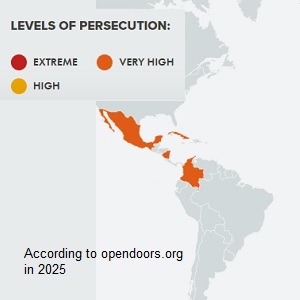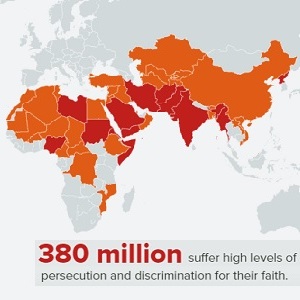Tsiyon Messianic Radio Newsletter - Vol 20.10 - 13/14/6024
TAM - 03/14/2025 AD
|
|
 |
|
|
|
|
From Eliyahu
This last week has been a very difficult time for Christians in Syria. Many
of them have been massacred by radical Jihadists who have been on a killing
spree. Estimates from knowledgeable individuals and organizations range from
less than a hundred into the thousands of Christians who have been murdered,
while many others have fled the country. Let’s be holding them up in prayer.
For my newsletter this week, to honor these brave Christians, I would like
to shed light on the history of the Gospel and Christianity in Syria.
The province of Syria was established after the Roman conquest in the 1st
century BC, and it included significant cities like Antioch and Damascus,
from which the original gospel message later went out to Jews and Gentiles
of the Roman world. The general area of what we call Syria today was part of
the Roman Empire as the province of "Syria," which encompassed a larger
region than modern Syria, including parts of present-day Turkey, Lebanon,
Jordan, and Israel.
The 1st century AD Nazoreans, the original followers of Yeshua Messiah and
His Davidic family (from whom the Gentile "Christians" later broke away in
the 2nd century) established communities in Syria, before the destruction of
Jerusalem in 70 AD. They had received prophetic instruction to get out of
Judea immediately upon seeing the onset of a Roman siege of Jerusalem.
Historical sources confirm that the Nazoreans obeyed that instruction and
fled to Syria en masse. Before Jerusalem fell, those early believers fled to
Pella, in the Decapolis region of Roman Syria, which was then populated
mostly by Gentiles. The Nazoreans later spread into surrounding areas, where
they maintained their faith in communities for centuries.
In Syria, the Nazoreans, in hindsight sometimes called "Jewish-Christians"
often engaged with both Jewish and Gentile communities (although they were
eventually rejected by both). Nazoreans retained their distinct identity,
retaining their Jewish roots and the continuity of the Hebrew Scriptures.
Over time in the 2nd century, Gentile Christianity began to distinguish
itself from Judaism, and from the Nazoreans. Justin the Philosopher, a
Roman, learned of the Gospel from the Nazoreans in Syria, whose message he
combined with his Greek philosophy to produce a Gentile Christianity that
embraced Christ while casting off the Commandments, along with all things
considered Jewish. Justin's modified Gospel became the norm among the vastly
more numerous Gentile "Christians" who developed into Orthodox Christianity.
By the 4th century, Christianity was established as the dominant faith in
the region, leading to the Council of Nicaea in 325 AD, which aimed to
dictate Christian dogma. With the rise of the Byzantine Empire, Syria became
a vital part of Orthodox Christianity, characterized by the establishment of
churches, monasteries, and theological schools. However, theological
disputes, including the Christological controversies leading up to the
Council of Chalcedon in 451 AD, created rifts, notably resulting in the
formation of the Syrian Orthodox Church (members of the non-Chalcedonian
tradition) and the Eastern Orthodox Church.
The Islamic conquests in the 7th century reshaped the religious landscape.
Many Christians faced persecution and discrimination under Muslim rule.
Nevertheless, churches remained significant within the community,
maintaining a presence through the centuries.
|
 
The Byzantine Empire's decline and the rise of various local powers further
complicated Orthodox Christianity's role in Syria.
During the Islamic Ottoman era, Orthodox communities, particularly the Greek
Orthodox and the Syrian Orthodox, navigated a complex relationship with the
empire, gaining the millet system's protections. Under that system
Christians were required to pay a head tax to the Ottoman government,
charged only to non-Muslims, known as the jizya. If they paid the tax the
expectation was that they would not be killed as infidels, although that
sometimes happened anyway.
The 19th and early 20th centuries saw the rise of nationalist movements,
affecting Christian communities and leading to demographic shifts.
The 21st century may be the worst century so far for Orthodox Churches in
Syria. Especially since 2011 a growing number of churches and church
artifacts in Syria were destroyed or damaged by ISIS and other terrorist
groups.
Notable examples of Church destruction include:
St. Michael's Church in Aleppo - This historic church was
severely damaged during the conflict.
The Armenian Catholic Cathedral of Our Lady of the Annunciation in
Aleppo - It was destroyed in 2012.
St. George's Church in Raqqa - Another significant church that
fell to destruction under ISIS.
The Church of St. Sergius and Bacchus in Aleppo - Damaged during
the fighting and used as a military site.
Mar Elian Monastery in Al-Qaryatain - This ancient monastery was
destroyed in 2015, with some reports indicating it was repurposed for
military purposes by ISIS.
St. Paul’s Orthodox Church in Aleppo - Declared a military target
and subsequently damaged.
Syriac Orthodox Church of the Virgin Mary in Raqqa - Destroyed
amidst the violence of the area.
In addition to the churches, numerous artifacts, including centuries-old
manuscripts and religious icons, were looted, damaged, or destroyed, further
erasing the cultural heritage of Christian communities in the region. The
persecution has had a profound impact on the Christian population in Syria,
leading to significant losses of life and heritage.
Exact numbers are impossible to ascertain, but thousands of murders and
other atrocities have been perpetrated on Christians in Syria since 2011.
Estimates indicate that approximately 1.5 million Christians have fled from
Syria since the onset of the civil war in 2011. Prior to the conflict, there
were around 1.5 million Christians in Syria, but by 2021, this number had
significantly diminished, with Christians now making up only a miniscule
fraction of the population. Many have sought refuge in neighboring countries
such as Lebanon and Jordan, as well as in Europe and North America, greatly
contributing to the challenges faced by the stalwart few Christians still
remaining in Syria.
Nearly 20 centuries have passed since Yeshua warned His people about persecution
in this world. In Matthew 10 He said a lot about that, including this:
"You will be hated by all men for my name’s sake, but he who endures to
the end will be saved." (Matthew 10:22)
After 20 centuries of persecution we know that Yeshua's disciples being hated by
this world is just as certain as the sun coming up in the morning. We must
internalize that as applying to us and we must expect it. Why? Because its true,
and if we don't adopt that mindset we won't be ready for the worst. If we aren't
ready for the worst, then we might not endure through the persecution when it
comes, to be saved.
Endure to the End is the theme of tonight's panel discussion on
our live stream. Join us for our live stream discussion
tonight, at
Tsiyon.Net
at 8 PM. Be there, to be ready to endure.
Eliyahu
Tsiyon.Org
See this tonight!
|
|
 |
|
|
|
|
|
|
|
"In the world you shall have tribulation; but be
of good courage!
I have overcome the world."
John 16:33
| |
Thanks to our Tsiyon Ministry Partners for your support of this ministry!
Not a Tsiyon Ministry Partner yet? Visit our Tsiyon
Website
for full details.
|
|
|
|
|
|
|
Leave
feedback, prayer requests and comments
here.
You may unsubscribe
here.
|
|
|
Tsiyon
9901 Brodie Lane
Suite 160, Unit 1421
Austin, TX, USA, 78748
Please make offering checks to: "Tsiyon."
|
 |
 |
 |
|
|
|
|
|
|
|